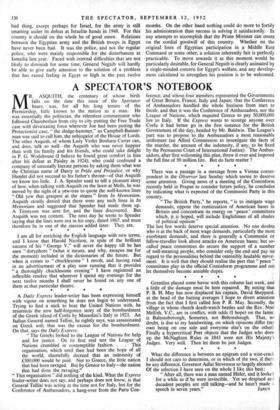A SPECTATOR 'S NOTEBOOK R. ASQUITH, the centenary of whose
birth falls on the date this issue of the Spectator bears, was, for all his long tenure of the Premiership, little known to the nation as a man. He was essentially the politician, the relentless commentator who followed Chamberlain from city to city putting the Free Trade case with devastating force wherever Joe had been putting the Protectionist case, " the sledge-hammer," as Campbell-Banner- man was said to call him, the subjugator of the House of Lords. The other Asquith, of whom Lady Violet Bonham Carter can, and does, talk so well—the Asquith who was never happier than with his family and his friends, who could take delight in P. G. Wodehouse (I believe he found great comfort in him after his defeat at Paisley in 1924), who could confound a company of unusually literate persons by asking them what was the Christian name of Darcy in Pride and Prejudice, or why Hamlet did not succeed to his father's throne—of that Asquith we know too little. J. A. Spender used to tell a pleasant story of how, when talking with Asquith on the lawn at Mells, he was moved by the sight of a yew-tree to quote the well-known lines " Old yew that graspest at the stapes " from In Memoriam.. Asquith stoutly denied that there were any such lines in In Memoriam and suggested that Spender had made them up. A Tennyson was sent for, and the lines discovered. But Asquith was not content. The next day he wrote to Spender saying that the lines were not in his copy, dated 1867, and must therefore be in one of the stanzas added later. They are. * * * *


































 Previous page
Previous page